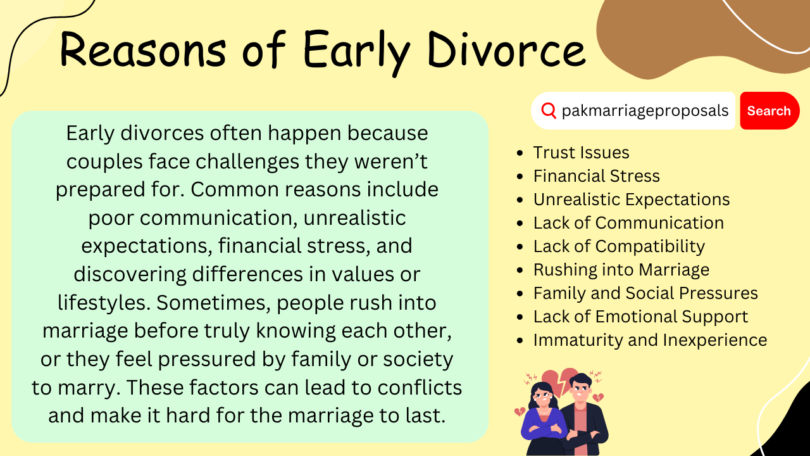Understanding Early Divorce
Early divorce refers to the end of a marriage within the first few years, often before couples have had the chance to fully understand each other’s life goals, values, and personalities. Common factors contributing to early divorce are a lack of preparation, unrealistic expectations, or unresolved personal issues. By recognizing these factors, couples can take proactive steps to strengthen their relationships.
1. Lack of Communication about Reasons of Early Divorce
One of the primary reasons for early divorce is poor communication. Communication is the foundation of any successful relationship, and when it’s lacking, misunderstandings, resentment, and conflict often arise.
Key Communication Issues
- Not openly discussing feelings and concerns
- Avoiding difficult conversations about finances, responsibilities, or future goals
- Struggling with expressing needs or listening actively
Solution: Establishing open, honest, and frequent communication. Couples should prioritize sharing their feelings, discussing challenges, and listening to each other’s needs.
2. Unrealistic Expectations of Reasons of Early Divorce
When individuals enter marriage with expectations that aren’t realistic, disappointment can quickly set in. Unrealistic expectations often stem from social media, romantic movies, or societal pressures that portray marriage as effortless.
Common Unrealistic Expectations
- Believing love alone will solve all issues
- Expecting a perfect partner with no flaws
- Assuming marriage will bring constant happines
Solution: Couples should focus on building a realistic understanding of marriage, embracing imperfections, and approaching the relationship as a journey that requires effort, compromise, and commitment.
3. Financial Incompatibility
Financial stress is a significant factor in many early divorces. Differences in spending and saving habits, lack of financial planning, or unexpected financial burdens can create strain.
Financial Conflicts
- Disagreements over budgeting and spending
- One partner having substantial debt or financial obligations
- Inability to align on long-term financial goals (e.g., buying a house, saving for retirement)
| Financial Conflict | Examples | Solution |
|---|---|---|
| Budget disagreements | Spending too much vs. wanting to save | Create a joint budget, set priorities |
| Debt-related stress | Unexpected debt from one partner | Be transparent, work on repayment |
| Different financial goals | Investing vs. saving conservatively | Discuss and align on financial plans |
Solution: It’s crucial to have open discussions about financial expectations and create a budget plan together. Couples can consider seeking financial counseling if conflicts persist.
4. Lack of Intimacy and Emotional Connection
Intimacy is both physical and emotional, and a lack of it can create distance between partners. Many couples experience a decline in intimacy and emotional connection soon after marriage, leading to feelings of isolation.
Factors Contributing to Loss of Intimacy
- Stress and busy schedules
- Unresolved conflicts or past traumas
- Physical or emotional neglect
Solution: Couples should make time for one another, express appreciation, and nurture their emotional and physical connection. Regular date nights, open conversations about desires, and showing affection can help revive intimacy.
5. Incompatibility of Life Goals
Early marriages often end because partners realize they have conflicting life goals. For example, one partner may want children while the other doesn’t, or one might prioritize career advancement while the other values family time.
Common Life Goal Differences
- Family planning: having children vs. remaining child-free
- Career ambitions: relocating for work, work-life balance
- Personal goals: travel, pursuing education, or lifestyle choices
Solution: Couples need to discuss and align their life goals before marriage. A shared vision can help avoid conflicts and ensure both partners are working towards mutual objectives.
6. Interference from Family and Friends
While family and friends can offer support, constant interference can strain a new marriage. Whether it’s unsolicited advice or pressure from in-laws, third-party influence can create tension and division between partners.
Types of Interference
- Pressure from family members regarding lifestyle choices
- Conflicts between in-laws and one partner
- Friends offering biased advice or taking sides
Solution: Couples should establish boundaries and prioritize each other’s views. Openly discussing how to handle family involvement can reduce conflicts and help maintain harmony in the relationship.
7. Emotional or Physical Abuse
Unfortunately, abusive behaviors—whether emotional, physical, or psychological—can emerge after marriage, causing immense pain and insecurity. Abuse can erode trust, damage self-esteem, and make it impossible for a marriage to survive.
Signs of Emotional or Physical Abuse
- Controlling behavior or manipulation
- Verbal insults, threats, or physical harm
- Isolation from family or friends
Solution: Abuse is a serious matter and should be addressed with professional support. Couples should seek counseling, and individuals in abusive relationships should prioritize their safety and well-being.
8. Differences in Cultural or Religious Beliefs about Reasons of Early Divorce
Marriage often highlights the cultural or religious differences between partners, leading to potential conflicts in lifestyle, family traditions, and core values. Over time, these differences can create a rift if not addressed with respect and compromise.
Typical Cultural/Religious Conflicts
- Celebrating certain holidays or religious practices
- Adhering to family traditions or customs
- Conflicting beliefs about child upbringing
Solution: Respecting each other’s beliefs and finding ways to blend cultural or religious traditions can help bridge the gap. Seeking guidance from a counselor specializing in multicultural relationships can also be beneficial.
9. Stress from Parenting Responsibilities
For couples who have children shortly after marriage, the stress of parenting can quickly become overwhelming. Balancing work, personal time, and childcare responsibilities often strains the relationship, especially if one partner feels unsupported.
Parenting Stressors
- Division of childcare duties
- Financial pressure from raising children
- Disagreement on parenting styles
Solution: Couples should work as a team and share responsibilities fairly. Setting aside time for each other, even amid parenting duties, is essential for maintaining connection and reducing stress.
You May Also Like









Leave a Comment